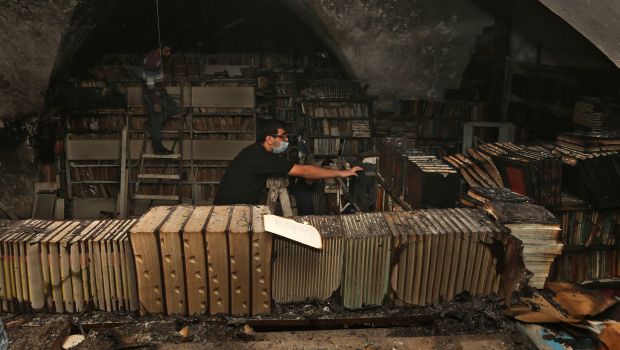The news about the destruction of the Saeh Library—which also served as a cultural center—in the Lebanese city of Tripoli came as a real shock, and made me wonder how such a crime against culture should be understood. Who was behind the attack, and what was their justification? Bookshops are an important part of the identity of our cities.
There are a few points to ponder. First, it is no secret that in the East, and the Middle East in particular, we—as Muslims, Christians, Hindus and so on—are not as concerned as we should be with, nor do we pay enough attention to, our cultural heritage.
Second, like a caricature that shows a deformed picture such as a person with a head like a pea but with a bloated stomach as big as a ball, politics in our communities is taking up all the space. Strangely enough, following the burning and destruction of the Saeh Library in Tripoli, numerous political pronouncements were published by all parties, governments, religious leaders, politicians and so on. In October 2012, Father Ibrahim Srouj, the founder and owner of the Saeh Library, gave a TV interview with MTV in which he very frankly stressed his deep concerns, revealing that the Saeh Library was on the verge of vanishing. No one paid attention. Clearly, when the sound of the gun is so loud, the light of culture becomes extremely weak.
In the city of Oxford in the UK, there is a historic bookshop on Broad Street: Blackwell’s, founded in 1879. The collection is so huge and thorough that it would be a challenge to go there and not find the book you are looking for. This library is one of the places that make Oxford such a prestigious city. In Oxford, you can find churches and colleges—and pubs—founded four or five centuries ago. These places collectively form the identity of the city.
We have thousands of years of history of culture and civilization, and yet we destroy our identity and neglect our heritage. When the minaret of Aleppo’s Umayyad Mosque was destroyed in the fighting, I wrote here in Asharq Al-Awsat that the priceless minaret was more valuable than Assad’s regime.
Third, Tripoli has a mixed Christian and Muslim identity. The people of Tripoli, with a strong sense of humor, call Father Ibrahim Srouj a “Christian Muslim.” When you talk with Father Srouj, you forget that you are Muslim and he is Christian. The Saeh Library had both Islamic and Christian books placed next to each other.
Fourth, I think we need to establish NGOs in our cities to organize campaigns to protect our cultural heritage. Fortunately, some of the youth of Tripoli gathered at the Saeh Library and tried to protect the books that survived. After seeing them, Father Srouj said that the library would be rebuilt, even better than before, showing the light of hope in both his words and eyes.
Fifth, there is an Arabic proverb that I often hear from my Lebanese friends: “Many a harmful thing turns out to be beneficial.” If Lebanon’s people reflect on this bitter event, they will see the value of devising a program to protect all Lebanon’s cultural heritage. I think such heritage belongs to both countries and people, while governments are only guests. A government is not the owner of the country, and so its members are willing to sacrifice everything to keep their own power. Unfortunately, governments often do not look at the far horizon, trapped as they are in the short-term demands of the moment. Memory in politics is short, and it evaporates into the air, but culture is the essence of existence, and so it remains. This is the great lesson of history.
Sixth, it is said there are two excuses offered for the arson attack that burned down the Saeh Library. Firstly, an unknown group claimed that Father Srouj had a connection with the publication of a study seen as insulting to the Prophet of Islam. Clearly, this is false. Everyone who knows Father Ibrahim Srouj understands that his heart is full of love to all prophets. I can say he knows and has tasted the spirituality and beauty of the Qur’an, far more than even some Muslim clergymen! Since his mother tongue is Arabic, he knows the elegance of the divine verses of the Qur’an.
It has also been said that the reason behind the Saeh Library incident might be a commercial one: that the owner of the building wanted to sell it, and so the bookshop had to go. I have no idea if this rumor is true, but what I do know is that the municipal authorities and the mayor of Tripoli could use their powers to register and protect all cultural and historic buildings. In addition, it is their responsibility to keep such things alive and vibrant. The Ottoman building where the Saeh Library existed should be rebuilt. In Beirut, I visited some very beautiful cultural buildings that were renovated by the late Prime Minister Rafik Hariri. Tripoli is the second city of Lebanon, and the Saeh Library was the eye of the city. Such a bright and beautiful eye needs an ophthalmologist, not a butcher.
